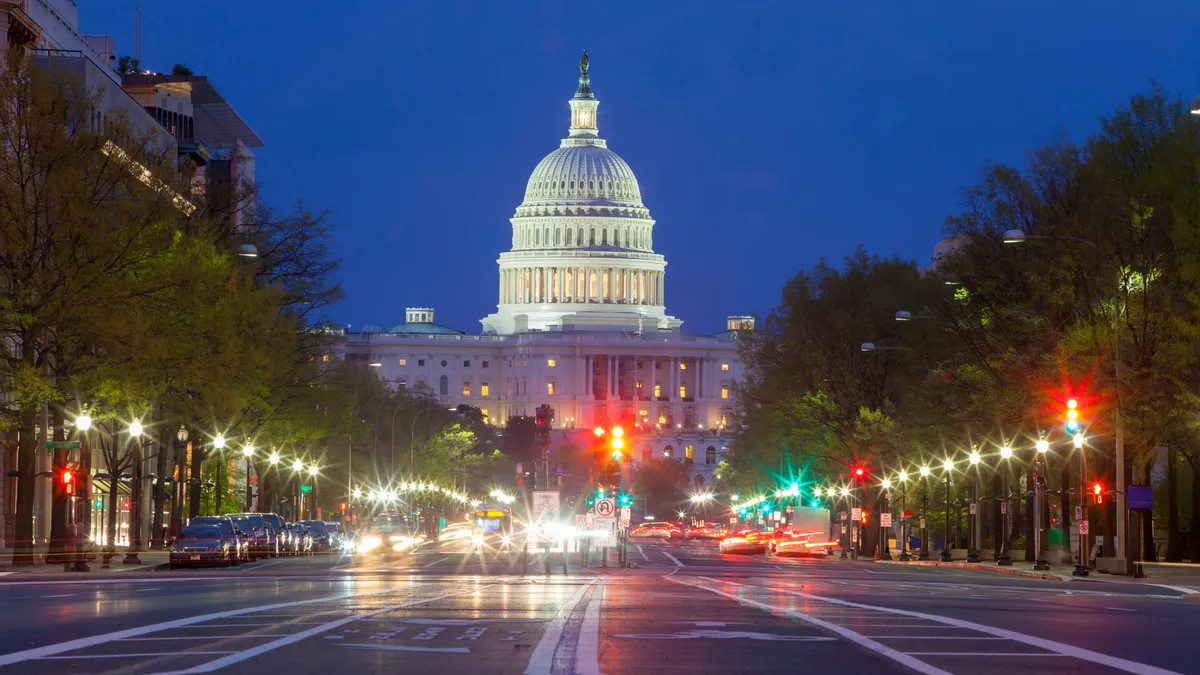Dive Brief:
-
A group of Democratic senators and representatives on Tuesday wrote to the Federal Energy Regulatory Commission, urging the regulatory body to shut down a net metering proposal that experts say would effectively overturn the policy nationally.
-
The proposal at hand would subject any behind-the-meter, or customer-sited, energy generation to FERC jurisdiction, arguing that power production constitutes a wholesale sale. In the letter, Congress Members questioned FERC's authority to make such a rule and also asked the commission to ask the petitioner, New England Ratepayers Association (NERA), to disclose its members.
-
"If FERC granted NERA's petition, it would overturn long-held precedent and give the federal government decision-making power that has long belonged to the states, including the authority to set rates, terms, and conditions for programs," the letter reads. "These decisions are best left to state regulators."
Dive Insight:
A number of state regulatory agencies have submitted motions to intervene in the docket or extend the time period allotted for comments. FERC agreed to a National Association of Regulatory Utility Commissioners (NARUC) request for comment extension in part earlier this month, allowing a 30 day extension. NARUC had asked for 90 days.
"All regulators — state and federal — are called to serve the public interest. By limiting our response time — during a historic global pandemic — FERC has clearly decided to prioritize expediency over serving the public interest," said Mississippi Commissioner and NARUC President Brandon Presley in a May 5 statement. "Although we were obviously hoping for a more reasonable time to develop our formal reply, we will work diligently in the weeks to come to fight this unwarranted challenge to state authority."
The NERA proposal, initially filed in April, would require that any energy produced behind the meter and sold to a utility be considered a wholesale sale. Legal experts previously told Utility Dive they were unsure what such a structure would look like, if the petition were successful, but solar groups are wary of its potential consequences.
"There's a lot of uncertainty about what those exact implications will be," Glen Brand, vice president of the policy and advocacy program at Solar United Neighbors told Utility Dive. "But the legal community that we've consulted with takes this seriously. ... We know that, say, if net metering is ended as we know it, we're talking about a substantial reduction in ... the net metering rate for many places around the United States." Solar United Neighbors, in partnership with Vote Solar, built a website urging states' rights and solar advocates to protest the petition, based on the volume of concern both groups were receiving from member companies across the country.
"As soon as this petition was announced in April, [members] had a lot of questions about what the likely impacts could and may be if ... the federal government takes control of what's primarily been the state's role in formulating policies like net metering," said Brand.
Federal Democratic lawmakers say the move would be an affront to state authority and exceed FERC's authority under the Federal Power Act.
The group of senators and representatives, which include Sens. Bernie Sanders, I-Vt., Elizabeth Warren, D-Mass., and Cory Booker, D-N.J. also defends the policy in general. Under net metering policies, residential and commercial solar customers are able to sell their excess solar back to the grid. Many credit the practice for incentivizing solar buildouts across the country, and 38 states plus Washington, D.C. have a net metering policy in place, according to the Solar Energy Industries Association, and another seven have some additional form of distributed energy compensation.
"On average with these systems, about 20 to 40 percent of a customer's energy is fed back onto the distribution grid, helping create a more resilient, responsive and flexible power grid," Tuesday's letter read. "States have engaged in deliberate, thoughtful processes to develop and implement net metering laws, which has led to the development of a renewable energy industry employing more than 800,000 workers nationwide."
Not everyone is pro-net metering, though. Utilities often criticize the practice for unfairly impacting customers who don't own solar. Under the practice, a utility pays for excess generation at a retail rate, which often exceeds the wholesale rate, NERA notes in its petition. And although FERC has set precedent for not regulating these sales in previous cases, the group argues it was "improper for the Commission to do so."
Senators and Representatives also asked FERC to require the group disclose its members — according to documents obtained by Public Citizen, the group represents 12 groups with contributions totaling $245,000 in 2018, the letter notes.
"It appears that NERA operates more like a trade association, representing the interests of a select number of industry or utility players, rather than a grassroots ratepayer group that represent the public interest," it reads. "NERA should disclose its membership to FERC, so parties can understand who is asking for these important changes that will affect the 45 states with net metering laws in place."
Final comments on the petition are due June 15.














